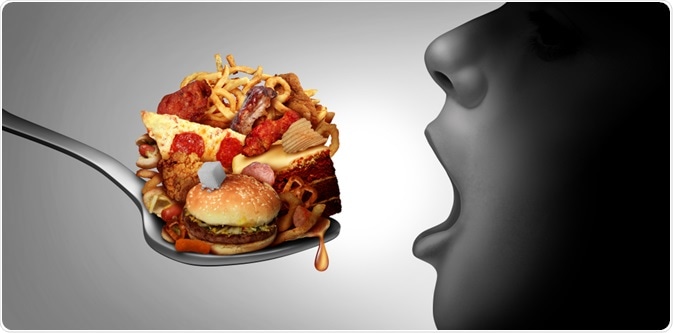A person can be diagnosed as having a binge eating disorder (BED) when he or she eats an extreme amount of food over a short period of time without purging the food from the body. The individual may do this even when they are not hungry and become over-full to the point of discomfort after consuming an excessive amount. Some people buy extra food especially for the purpose of binge eating.

Image Credit: Lightspring / Shutterstock.com
Characteristics of a BED
The person with the BED tends to carry out the activity in private. This is often because the individual does not feel happy after the binge and instead feels embarrassed for anyone to know about it. They may have a sense of shame, guilt, or depression about their actions.
The bingeing behavior is also characterized by not being a one-off experience but one that is repeated regularly. For a person to be diagnosed as having the disorder, the activity needs to happen at least once a week for three months.
Diagnosis
BED is classified as a mental health disorder and has been included in the most recent edition of the Diagnostic and Statistical Manual of Mental Disorders (DSM-5) that was published in 2013. This publication by the American Psychiatric Association provides an overview of recognised mental health disorders and is used by clinical staff to help them diagnose the different disorders in patients.
A doctor will help to diagnose the type of disorder that the patient is experiencing. Other types of common eating disorders include anorexia nervosa, in which a person will try to keep their weight at a minimum through refraining from food or over-exercise, and bulimia, which involves binge eating and then making yourself sick to bring all of the food back up or using laxatives to excrete the food from the body as soon as possible.
A First-Person Account of Binge Eating Disorder | WebMD
Impact of binge eating
Eating disorders are dangerous to the health of a person suffering from a condition. Overeating can cause physical changes in a different way to disorders where a patient may under-eat and malnourish their body. The patient can start to gain considerable weight from the extra calories consumed.
The binge eating patient tends to opt for foods that are high in carbohydrates and can lead to high blood sugar. As a result, with the process repeated frequently, the patient can start to expose themselves to major health risks from high blood pressure, type 2 diabetes, cholesterol, heart disease, cancers, and gall bladder disease.
The types of people who binge eat
In this particular disorder, the lifetime prevalence is 2% for men and 3.5% for women. Therefore, BED is one of the three most widely occurring eating disorders. This disorder tends to start in young people but the person’s binge eating may not come to light to medical professionals or friends and family until they are much older, as it is an activity that people are ashamed of revealing.
Binge eating is often accompanied by other health problems. Some patients also have anxiety, a sense of worry and fear which can make a person restless, a lack of concentration, and an inability to sleep. The condition can vary in its seriousness but can also include heart palpitations.
Depression can be a factor for some individuals with BED. When depression is involved, the patient can have a sense of helplessness which goes on for weeks and months. Their interest in activities that they previously enjoyed has waned and they may also have suicidal feelings.
Other conditions that can accompany BED are personality disorders. With this, the patient has different ways of thinking from most other people, which presents itself as unusual behaviors that are most often considered to be odd. These disorders can lead to difficulties in relationships, distress, negative feelings, and isolation.
References
Further Reading
Last Updated: Feb 21, 2023